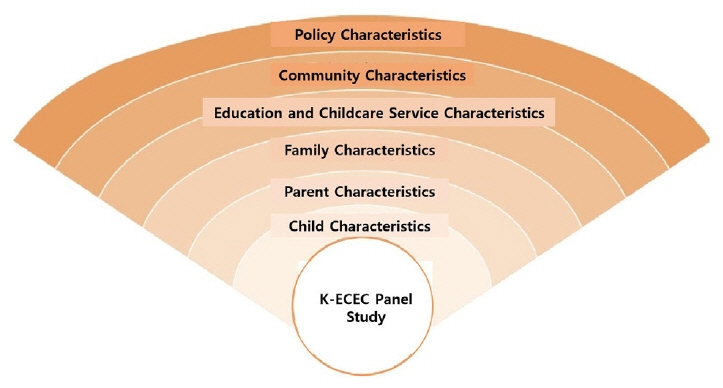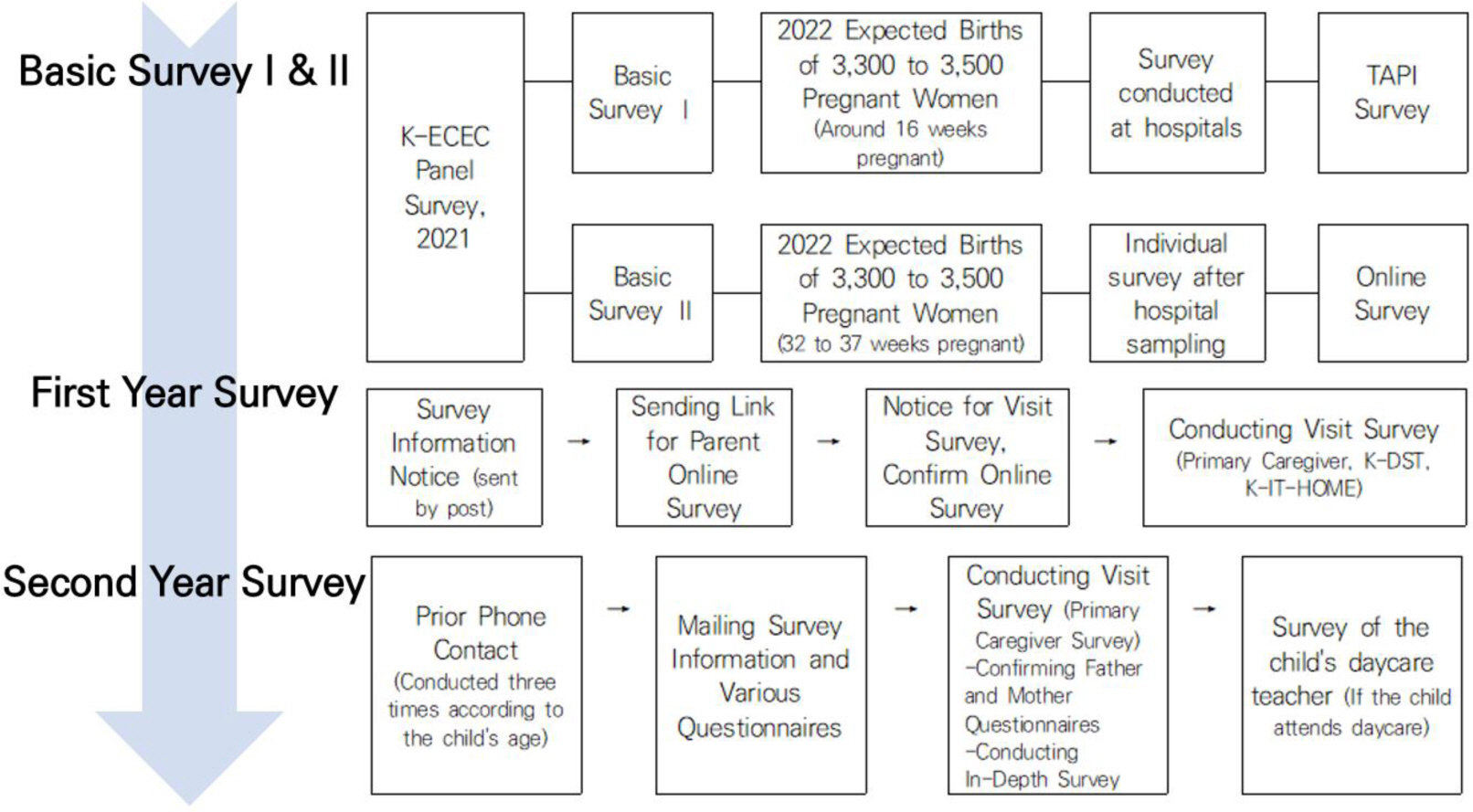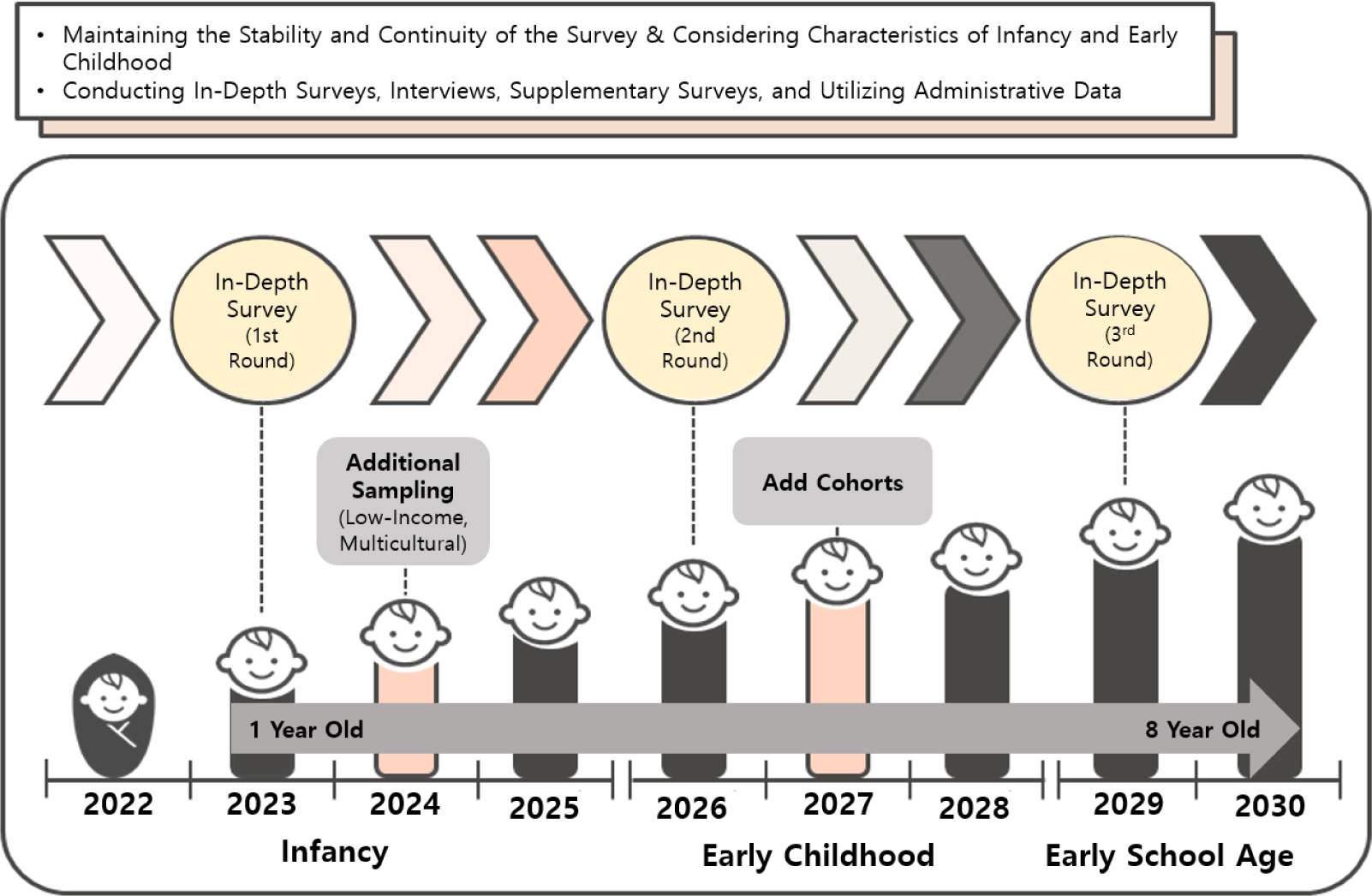J Korean Matern Child Health
.
2024 Jul;28(3):95-110. 10.21896/jkmch.2024.28.3.95.
Korean Early Childhood Education and Care Panel Study: Data Utilization Strategies for Policy and Practice
- Affiliations
-
- 1Korea Institute of Child Care and Education, Seoul, Korea
- KMID: 2558201
- DOI: http://doi.org/10.21896/jkmch.2024.28.3.95
Abstract
- The Korean Early Childhood Education and Care Panel Study (K-ECEC panel study), commencing in 2021, aimed to collect data related to early life growth and development. In particular, based on Bronfenbrenner’s ecological model, the study aims to collect intrinsic and extrinsic parental factors, educational and caregiving experiences in institutions, and environmental factors from the prenatal stage through infancy, toddlerhood, and early childhood. This is important for understanding child development with varied dimensional aspects. The K-ECEC panel study uses a stratified sampling strategy in order to recruit pregnant women based on regions and numbers of deliveries to individual hospitals. This resulted in the participation of 3,372 women, 95 of whom were from low-income families and 72 from multicultural families. The K-ECEC panel study is based on a household survey collecting information related to pregnancy, birth, and childrearing. The survey included an annual follow-up for individual households of newborns from 2022, and the second round of the survey was conducted in 2023. A total of 2,775 children participated in the first round of the survey, 1,423 of whom were boys. As there are few birth cohort studies considering policy-oriented aspects in Korea, the K-ECEC panel study is expected to provide data to understand childhood trajectories for growth and development. Furthermore, in terms of childcare and education, it is expected to be utilized to evaluate the policy effects of early life and parenting support.
Figure
Reference
-
Bae Y., Park EJ., Kim J., Cho K., Lee H., Kang M. orean early childhood education and care panel study 2023. Jincheon (Korea): Korea Institute of Child Care and Education;2023.Cho B., Shin N., Ahn J., Lee JR., Choi Y., Song S, et al. Korean children's panel study 2009. Jincheon (Korea): Korea Institute of Child Care and Education;2009.Cho M., Choi H., Kim D., Kim H., Kang M. Korean children's growth and development longitudinal study 2023. Jincheon (Korea): Korea Institute of Child Care and Education;2023.Ha EH., Kim BN., Kim YJ., Kim EJ., Kim HY., Kim YN, et al. Study on exposure to environmental hazards and health effects on pregnant women and infants (Part I) National Institute of Environmental Science. 2011.Ha M., Kim Y., Kim H., Bae S., Park H., Oh S. Study on the development of enterprise for tracking environmental conservation and health impacts on children (Part I). Incheon (Korea): National Institute of Environmental Science;2016.Lee J. Study on establishing a birth cohort surveillance system for standard growth metrics and chronic disease prevention in children and adolescents, Korea disease control and prevention agency. Busan (Korea): Inje University;2007.Lee JR., Bae Y., Kim J., Song S., Cho K., Lee KJ, et al. Korean Early Childhood Education and Care Panel Study 2022. Jincheon (Korea): Korea Institute of Child Care and Education;2022.Lee JR., Kim J., Lee G., Cho H., Lim J., Carlo G. Study on the establish-ment and validation of a cohort model for child growth and development in Korea. Jincheon (Korea): Korea Institute of Child Care and Education;2017.Lee JR., Park EJ., Kim J., Song S., Lee H., Lee JH, et al. Korean Early Childhood Education and Care Panel Study (Korean ECEC Panel Study). Jincheon (Korea): Korea Institute of Child Care and Education;2021.Ministry of the Environment. Japan: Japan environment and children's study [Internet]. Tokyo (Japan): Ministry of the Environment;[cited. 2024 May 30. Available from https://www.env.go.jp/chemi/ceh/en/about/outline.html.National Center for Education Statistics. Early Childhood Longitudinal Studies (ECLS) Program [Internet]. Washington, DC: National Center for Education Statistics;2023-24. [citied 2024 Feb 23]. Available from https://nces.ed.gov/ecls/kindergarten2024.asp.National Educational Panel Study. NEPS-Haupterhebungen 2021-2024 [Internet]. Bamberg (Germany): National Educational Panel Study;[citied. 2021 Mar 16. Available from https://www.neps-data.de/neps-cfm2020/Studien%C3%BCbersicht.Norwegian Institute of Public Health. What is the Norwegian mother, father and child cohort study? [Internet]. Trondheim (Norway): Norwegian Institute of Public Health;2021. [citied 2021 Mar 16] Available from https://www.fhi.no/en/studies/moba/what-is-the-norwegian-mother-and-child-cohort-study.Sylva K., Melhuish E., Sammons P., Siraj-Blatchford I., Taggart B. The effective provision of preschool education (EPPE) project technical paper 12: the final report-effective preschool education. London: University College London;2004.Yang HJ., Lee SY., Suh DI., Shin YH., Kim BJ., Seo JH, et al. The Cohort for Childhood Origin of Asthma and allergic diseases (COCOA) study: design, rationale and methods. BMC Pulm Med. 2014. 14:109.
Article
- Full Text Links
- Actions
-
Cited
- CITED
-
- Close
- Share
- Similar articles
-
- Needs on Early Childhood Sex Education of Teachers in Day Care Centers for Children
- Knowledge and Practice of Infection Prevention by Mothers of Young Children
- An expert opinion study on policy tasks and approaches for the oral health care systems integrations in South-North Korea
- Public's Perception of Reimbursement for Advanced Practice Nurses' Education and Counseling in Intensive Care Units by the National Health Insurance
- Dental care utilization patterns by the status of ADL and IADL in the elderly




